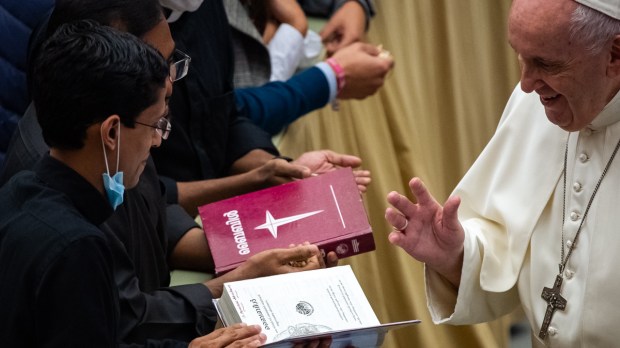The books of the Bible were written centuries ago, and yet, says Pope Francis, they were written to speak to you specifically.
“That Bible verse was written for me too, centuries and centuries ago, to bring me a word of God,” explained the pope, as he continued his teaching series on prayer.
The Bible was not written for a generic humanity, but for us, for me, for you, for men and women in flesh and blood, men and women who have a name and a surname, like me, like you.
The general audience of January 27 was dedicated to the theme of prayer that begins with a Bible passage. The Holy Father said that “the words of the Sacred Scripture were not written to remain imprisoned on papyrus, parchment or paper, but to be received by a person who prays, making them blossom in his or her heart.”
The Word of God goes to the heart. The Catechism affirms that: “prayer should accompany the reading of Sacred Scripture” – the Bible should not be read like a novel, it must be accompanied by prayer – “so that a dialogue takes place between God and man” (no. 2653).
Don’t miss the chance
The Holy Father noted how all believers have experienced how “a passage from the Scripture, heard many times already, unexpectedly speaks to me one day, and enlightens a situation that I am living.”
But in order to enable these moments, he said, “it is necessary that I, that day, be present for that appointment with that Word.” He reiterated the fear of St. Augustine, of missing the moment of grace and failing to recognize and listen to the Lord.
Every day God passes and sows a seed in the soil of our lives. We do not know whether today he will find dry ground, brambles, or good soil that will make that seed grow (cf. Mk 4:3-9). That they become for us the living Word of God depends on us, on our prayer, on the open heart with which we approach the Scriptures. God passes, continually, and through the Scripture. […] Through prayer a new incarnation of the Word takes place. And we are the “tabernacles” where the words of God want to be welcomed and preserved, so that they may visit the world.
The pope said that we shouldn’t approach Scripture with “ulterior motives,” using the Bible to support a personal philosophical or moral view, but in search of an encounter.
[T]he believer knows that those words were written in the Holy Spirit, and that therefore in that same Spirit they must be welcomed and understood, so that the encounter can occur. […] [T]he Word of God, infused with the Holy Spirit, when it is received with an open heart, does not leave things as they were before: never. Something changes. And this is the grace and the strength of the Word of God.
Lectio Divina
The pope noted how the Christian tradition is rich in reflections on prayer with Scripture, but he specifically pointed out the method of lectio divina.
It is first of all a matter of reading the biblical passage attentively: this is Lectio divina, first and foremost reading the Bible passage attentively, or more: I would say with “obedience” to the text, to understand what it means in and of itself. One then enters into dialogue with Scripture, so that those words become a cause for meditation and prayer: while remaining faithful to the text, I begin to ask myself what it “says to me.”
The pope cautioned that this step can lead us astray.
This is a delicate step: we must not slip into subjective interpretations, but we must be part of the living way of Tradition, which unites each of us to Sacred Scripture. The last step of Lectio divina is contemplation. Words and thoughts give way here to love, as between lovers who sometimes look at each other in silence. The biblical text remains, but like a mirror, like an icon to be contemplated. And in this way, there is dialogue.
A source of peace, and protection from Satan
Pope Francis said that even when Scripture challenges us, it gives us peace, and in moments of confusion, “it guarantees to the heart a core of confidence and of love that protects it from the attacks of the evil one.”
Through prayer, the Word of God comes to abide in us and we abide in it. The Word inspires good intentions and sustains action; it gives us strength and serenity, and even when it challenges us, it gives us peace. […] Christian life is at the same time a work of obedience and creativity. A good Christian must be obedient, but he or she must be creative. Obedient, because he listens to the Word of God; creative, because she has the Holy Spirit within who drives her to be so, to lead her on. Jesus, at the end of one of his parables, makes this comparison – he says, “Every scribe who has been trained for the kingdom of heaven is like a householder who brings out of his treasure – the heart – what is new and what is old” (Mt 13:52). The Holy Scriptures are an inexhaustible treasure.

Read more:
Just 2 min a day with the Gospels, and your life will change, says Francis

